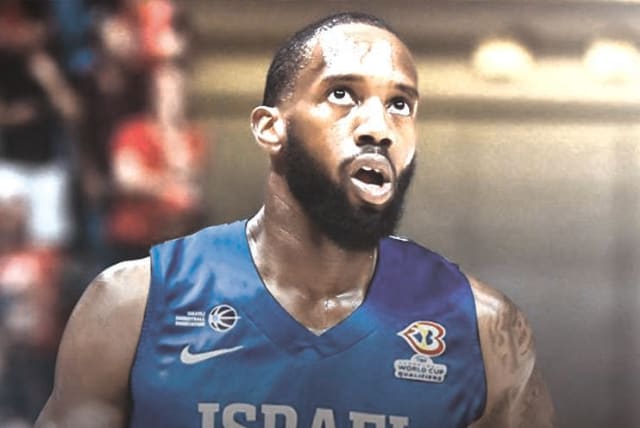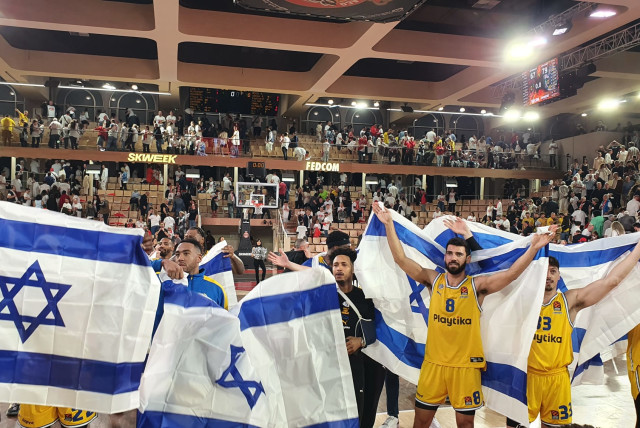Israel national basketball team trailing behind without a naturalized player - opinion

One would hope that all of these problems can be corrected when Israel plays a desperate 0-2 Ukraine in November, but other concerns will need to be addressed before that window as well.
Israel split its opening Eurobasket 2025 qualifiers over the past week, with a 72-70 win at Portugal and an 88-79 defeat in Slovenia. While the blue-and-white brass was probably very content with a 1-1 record on the road, there is plenty of work that has to be done.
Coach Ariel Beit Halachmi’s squad showed all kinds of issues throughout the two contests that will need to be solved going forward into the next international windows, which take place in November 2024 and then February 2025, with three of the four remaining games slated to take place at home.
Israel’s combined percentages in the two games from beyond the arc (10-of-55, 18%) and from the free throw line (25-of-43, 58%) were hideous, there was very little flow within the offensive game, and boxing out for rebounds on the defensive end was atrocious as both opponents did as they pleased on the offensive glass, corralling a combined 33 offensive rebounds.
One would hope that all of these problems can be corrected when Israel plays a desperate 0-2 Ukraine in a home-and-home series in November, but other concerns will need to be addressed before that window as well.
To start, the entire concept of having a naturalized player who can make a difference on the roster needs to be figured out immediately.
As per FIBA rules, every team is allowed to have one naturalized player on their squad, though, for one reason or another, the blue-and-white has yet to figure out how to bring a player in that can help in a variety of manners, as most other nations have.
Over the past few years, international basketball has seen naturalized players take center stage for countries across the spectrum.
Whether it’s Maccabi Tel Aviv’s American point guard Lorenzo Brown leading Spain to the most recent European Championship to seeing Codi Miller McIntyre helping Bulgaria take down the World Champion in Germany, nations small and large are finding a way to improve their chances by using the rules to their advantage.
However, for Israel to use the rules to its advantage, the player in question that it would like to have as a naturalized member of its squad has to meet the requirements of obtaining citizenship, which in the Holy Land is no simple manner. Whereas some countries hand out passports like bottled water, Israel does not.
Beit Halachmi had identified Hapoel Jerusalem guard Khadeen Carrington as a player he would like to have on the Israel roster as a naturalized player and the Israel Basketball Association worked diligently in trying to have the Interior Minister approve his citizenship application.
Naturalization in Israel is more complicated than in many European countries
However, the rules of citizenship in Israel are not as easy as 1-2-3 and if one isn’t becoming a citizen through the “Right of Return” laws, then the process becomes that much more difficult.
The IBA tried for nearly a year to ensure that Carrington would obtain citizenship, but unfortunately, the procedure was unable to come to a positive conclusion.
One athlete who did see his citizenship application approved was Hapoel Beersheba central defender Miguel Vitor, who has played with the Israel National Team in soccer over the past couple of campaigns and helped out in a position of need. But as governments in the country change, policies do as well. Perhaps if Carrington had submitted his application at the same time Vitor did his would have been approved as well, but alas…
There’s no question that Beit Halachmi was counting on Carrington receiving citizenship when he took over as the coach last summer for his first campaign with the National Team as it participated in the Olympic qualifying tournament.
Without a player like Carrington, who can provide instant offense, Israel has seen its attack sputter at times without having a go-to guy who can take the ball to the hoop unabashedly. Instead, the blue-and-white has needed to rely on outside shooting, which did not hit anywhere near the mark against Slovenia and Portugal.
It was crystal clear that Israel needed a creator and while Yam Madar is the closest to that, he’s still a work in progress and can’t bear the burden of offense by himself. Most of the other players need someone to play off of to get their chances, whether it’s from the inside or the outside.
Slovenia showed how well it can play as a team, with every player filling a certain role even without superstar Luka Doncic, who plies his trade during the season with the NBA’s Dallas Mavericks. Whether it was sharpshooter Klemen Prepelic, swingmen Jaka Blazic and Gregor Hrovat, or naturalized Slovenian big man Mike Tobey, it was clear that Israel’s opponent was a well-oiled machine, knowing exactly what it wanted to do and how it wanted to do it, while maximizing Tobey’s talents to its advantage.
There were points against Slovenia where it looked like it was the Varsity vs JV teams on the court, and that can’t happen again. While Israel took a quick 20-8 lead after the opening 10 minutes, it was not the Slovenian big guns who started the comeback, but rather the likes of Leon Stergar and Ziga Demic, not exactly household names.
Israel needs to get to that stage of play and also trust its depth, which was not the case against Slovenia. Beit Halachmi needs to know what he can expect from each player, who can do what to their best abilities, and then supplement the roster with a naturalized player who can help lift the blue-and-white to the next level.
While it sounds so easy, the fact is that the citizenship issue will always hang over the National Team and if that’s going to be the case, then Beit Halachmi and the IBA will need to figure out how to overcome that challenge. Just as club teams like Maccabi Tel Aviv have worked within the framework of the rules over the years as they may not like or agree with them, Israel must pinpoint a player who fits the citizenship regulations of the State of Israel and then work around that individual.
The issue with that is there may not be a specific player right now of the caliber needed who fits the bill to obtain citizenship swiftly. In the past, Israel had the likes of Alex Tyus, Rich Howell, and David Blu who filled a big man’s spot, which hasn’t been a major issue recently for Israel (although with Roman Sorkin having been injured in the Portugal game, Beit Halachmi certainly could have used a spare big man).
The spot that Israel needs to fill desperately is no doubt that of a guard who can both create for himself and create for others and who provides a point of attack at any single moment. That is the way the game of basketball has moved and Israel must advance with it as well.
To go into yet another international window – its second in a row – without a naturalized Israeli is yet another failure by the powers that be who are charged with ensuring that the National Team can compete to the best of its abilities.
A solution must be found and it’s up to the association’s management to figure out how to give Beit Halachmi and Israel the proper tools needed to succeed.
Jerusalem Post Store
`; document.getElementById("linkPremium").innerHTML = cont; var divWithLink = document.getElementById("premium-link"); if (divWithLink !== null && divWithLink !== 'undefined') { divWithLink.style.border = "solid 1px #cb0f3e"; divWithLink.style.textAlign = "center"; divWithLink.style.marginBottom = "15px"; divWithLink.style.marginTop = "15px"; divWithLink.style.width = "100%"; divWithLink.style.backgroundColor = "#122952"; divWithLink.style.color = "#ffffff"; divWithLink.style.lineHeight = "1.5"; } } (function (v, i) { });

